Is plant-based meat a healthier choice? Tips to help you decide.
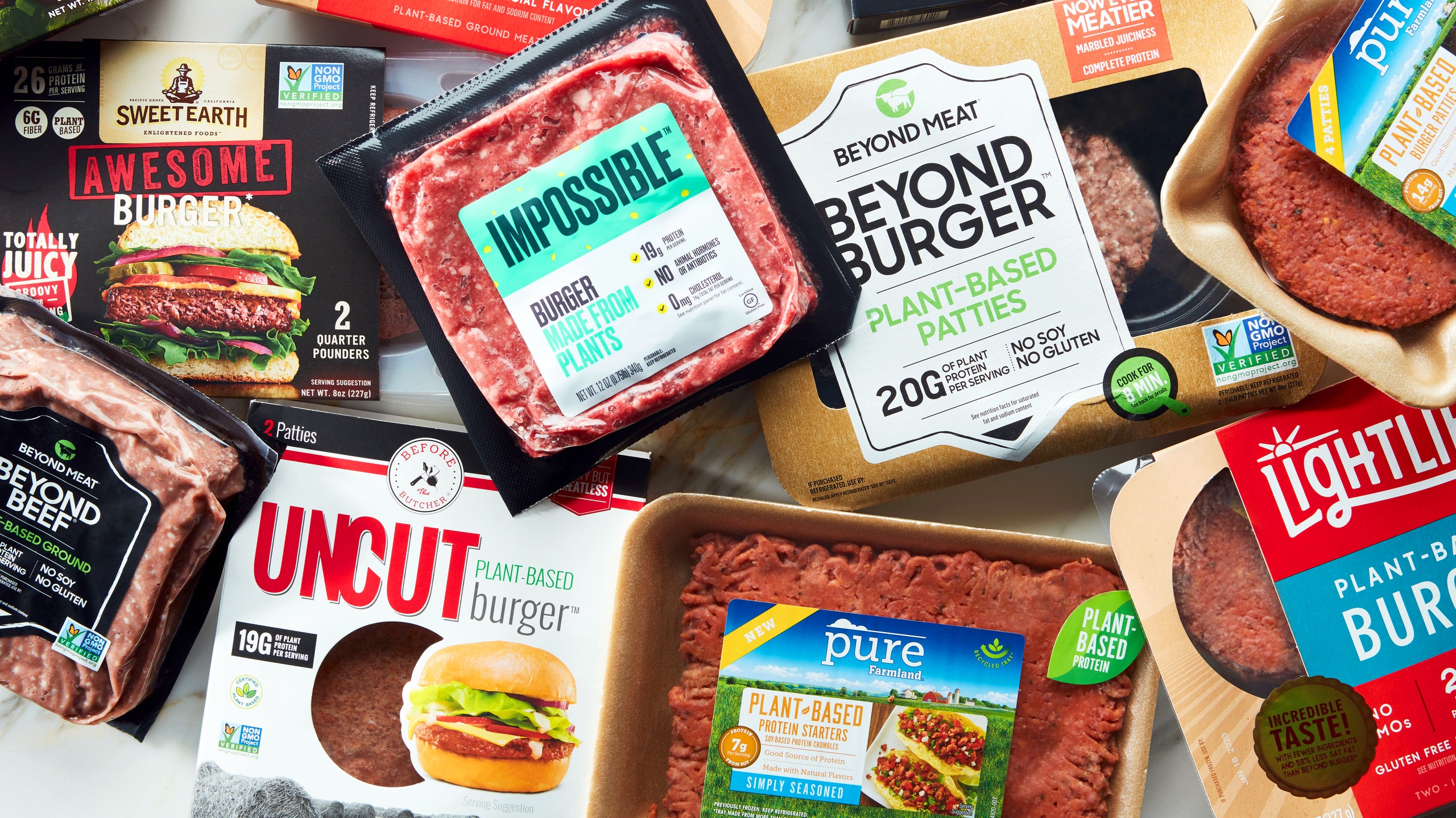
Is all plant-based meat the same?
Plant-based meat and burgers have been gaining in popularity. As a result, they are showing up on fast food and restaurant menus more and more. The Impossible Burger was the first to make headlines in 2016. Burger King debuted it three years later, but it wasn’t without controversy. For example, some patrons complained the meatless burger was not vegan unless requesting it be made with “no mayo”.
Also, Burger King, disclosed that the Impossible Burger is cooked on the same grill as real meat burgers. Therefore it may have some bits of meat on it. A Burger King spokesperson added, however, that customers may request their Impossible Burger be cooked in the oven and not on the grill alongside meat.
Plant-based meat has also been criticized for its additives, and high sodium, and saturated fat contents. Moreover, saturated fats are unhealthy fats, that may lead to higher cholesterol levels and an increased risk of heart disease. Foods high in sodium are also unhealthy and may result in higher blood pressure.
Let’ stake a look at five popular plant-based meat products and their nutritional values.
Impossible Burger
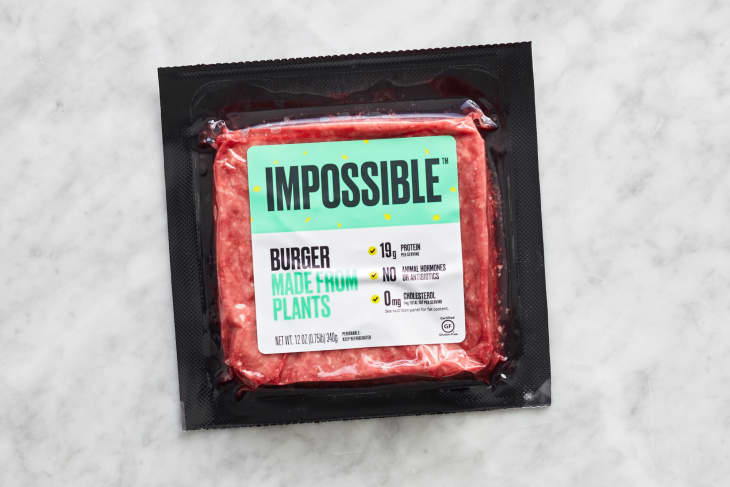
The first ingredient in the Impossible Burger is water. After that, we find soy protein concentrate, coconut oil, sunflower oil, “natural flavors” and 2% or less of potato protein. This is followed by Methylcellulose, Yeast Extract, Cultured Dextrose, Food Starch Modified, Soy Leghemoglobin, Salt, and Soy Protein Isolate.
Potatoes are low in protein, however, the biological value of potato protein is very good. An article published in Nutrients states potato protein to be “comparable to egg whites” and is therefore an excellent source of some amino acids. The Impossible Burger also contains soy protein. Soy protein has a biological value similar to beef and is therefore a complete protein.
The Impossible Burger is fortified with added vitamins and minerals, such as Mixed Tocopherols (Vitamin E), Zinc Gluconate, Thiamine Hydrochloride (Vitamin B1), Sodium Ascorbate (Vitamin C), Niacin, Pyridoxine Hydrochloride (Vitamin B6), Riboflavin (Vitamin B2), and Vitamin B12.
Impossible plant-based burger vs 93% lean/7% fat beef burger:
| Nutrition Information | Impossible Burger (4 oz) | 93%/7% burger (4 oz) |
|---|---|---|
| Calories | 240 | 172 |
| Total Fat (grams) | 14 | 7.9 |
| Saturated Fat (grams) | 8 | 3.3 |
| Cholesterol (milligrams) | 0 | 71 |
| Sodium (milligrams) | 370 | 75 |
| Dietary Fiber (grams) | 3 | 0 |
| Total Sugars (grams) | <1 | 0 |
| Protein (grams) | 19 | 24 |
| Vitamin/ minerals | Vitamin E, Vitamin C, B Vitamins, B12, Niacin, Zinc | Iron, Potassium |
On the plus side, the Impossible Burger has no cholesterol, 3 grams of dietary fiber, and is fortified with vitamins and minerals. It is also made with high-quality potato and soy proteins.
On the downside, it has 14 grams of total fat and 8 grams of saturated fat. This is significantly higher than that in the 93%/7% ground beef patty that has 8 grams of total fat and 3.3 grams of saturated fat. Calories and sodium levels are also higher in the Impossible burger.
Beyond Meat, The Beyond Burger
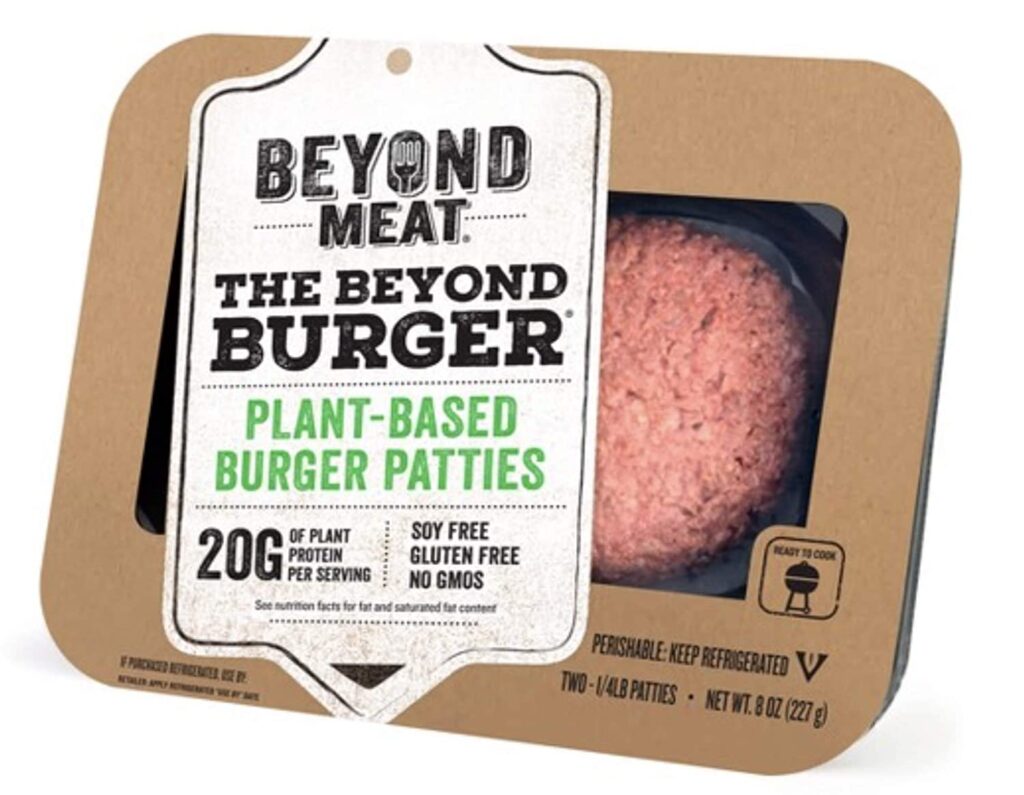
Similar to the Impossible Burger, the Beyond Meat burger ingredients also start with water. This is followed by Pea Protein, Expeller-Pressed Canola Oil, Refined Coconut Oil, Rice Protein, Natural Flavors, Cocoa Butter, Mung Bean Protein, Methylcellulose, Potato Starch, and Salt.
Mung bean protein is a source of folate, manganese, and magnesium. It also has some B vitamins. Pea protein alone is a complete protein.
Unfortunately, the list of ingredients in this plant-based meat also includes coconut oil and cocoa butter. Consequently, resulting in 18 grams of total fat and five grams of saturated fat.
Beyond Meat plant-based burger vs 93%/7% beef burger:
| Nutrition Information | Beyond Meat burger (4 oz) | 93%/7% burger (4 oz) |
|---|---|---|
| Calories | 260 | 172 |
| Total Fat (grams) | 18 | 7.9 |
| Saturated Fat (grams) | 5 | 3.3 |
| Cholesterol (milligrams) | 0 | 71 |
| Sodium (milligrams) | 350 | 75 |
| Dietary Fiber (grams) | 2 | 0 |
| Total Sugars (grams) | <1 | 0 |
| Protein (grams) | 20 | 24 |
| Vitamin/ minerals | Vitamin A, Vitamin C, Vitamin E, Potassium, Antioxidants (mung bean: folate manganese, magnesium) | Iron, Potassium |
On the plus side, this plant-based burger has 2 grams of fiber, and zero cholesterol, as well as high-quality pea protein.
It is not as fortified as the Impossible Burger. However, the Beyond Meat Burger does have some added nutritional value. For example, it includes Apple Extract (a source of flavonoids and antioxidants), and Pomegranate Extract (a source of vitamin A, vitamin C, and vitamin E). It also includes Potassium Chloride, Vinegar, Lemon Juice Concentrate, Sunflower Lecithin, and Beet Juice Extract (for color). Flavonoids and antioxidants are important for lowering the risk of heart disease as well as other illnesses.
On the downside, At 260 calories and 18 grams of total fat, this 4-ounce patty comes in higher than both the Impossible Burger and the 93%/7% beef patty. Additionally, sodium, protein, and fiber contents are about the same for the two plant-protein burgers.
Lightlife Plant-Based Ground Meat
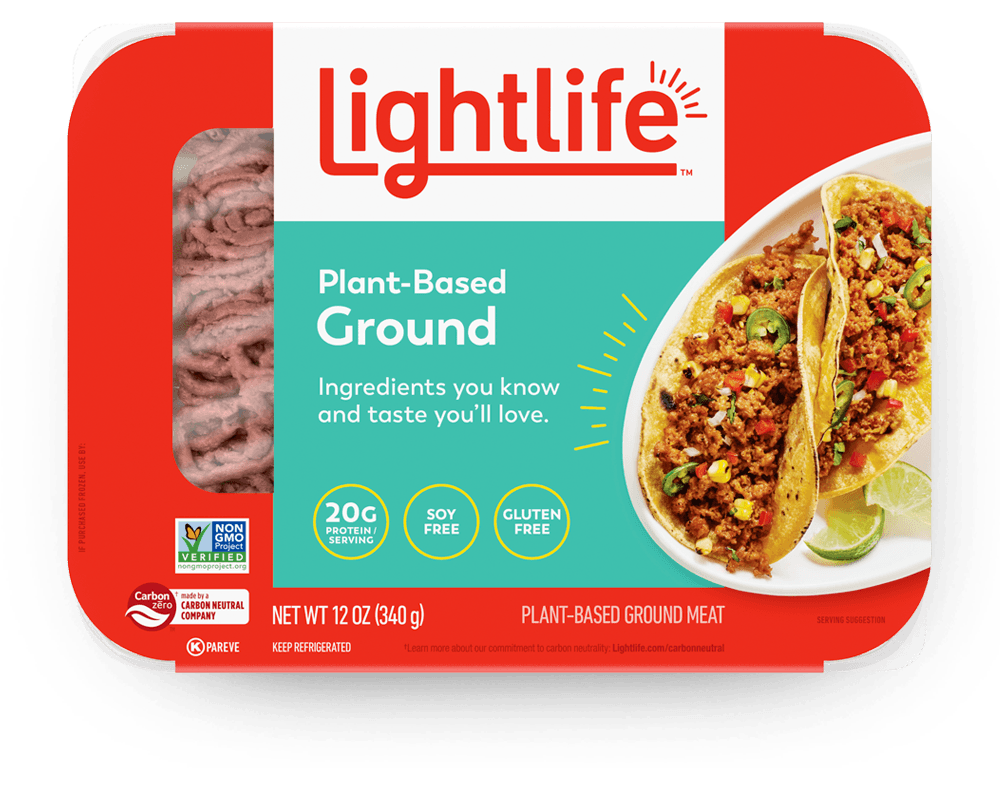
Similar to the other plant-based products, the first ingredient in Lightlife plant-based ground is water.
This is followed by pea protein, Canola Oil, Coconut Oil, Natural Flavors, Less Than 2% Modified Cellulose (from Plant Fiber), and Sea Salt. The list continues with Vinegar, Beet Powder (Color), Cane Sugar, and Cherry Powder (to promote color retention).
The Lightlife ground is also made with pea protein, which is a complete high-quality plant protein. Once again, however, the use of coconut oil adds unhealthy saturated fat.
Lightlife plant-based burger vs 93%/7% beef burger:
| Nutrition Information | Lightlife ground (4 oz) | 93%/7% burger (4 oz) |
|---|---|---|
| Calories | 250 | 172 |
| Total Fat (grams) | 17 | 7.9 |
| Saturated Fat (grams) | 5 | 3.3 |
| Cholesterol (milligrams) | 0 | 71 |
| Sodium (milligrams) | 390 | 75 |
| Dietary Fiber (grams) | 1 | 0 |
| Total Sugars (grams) | <1 | 0 |
| Protein (grams) | 20 | 24 |
| Vitamin/ minerals | Calcium, Potassium, Iron | Iron, Potassium |
The Lightlife burger is similar in calorie, and protein content to the other plant-based burgers. Additionally, grams of total and saturated fats are about the same.
On the plus side: the Lightlife burger is made from high-quality pea protein, and has the least number of added ingredients.
On the downside: it has the most sodium and the least amount of fiber than either the Impossible Burger or Beyond Meat burgers. The Lightlife burger has fewer vitamins and minerals.
Incogmeato Plant-Based Meat
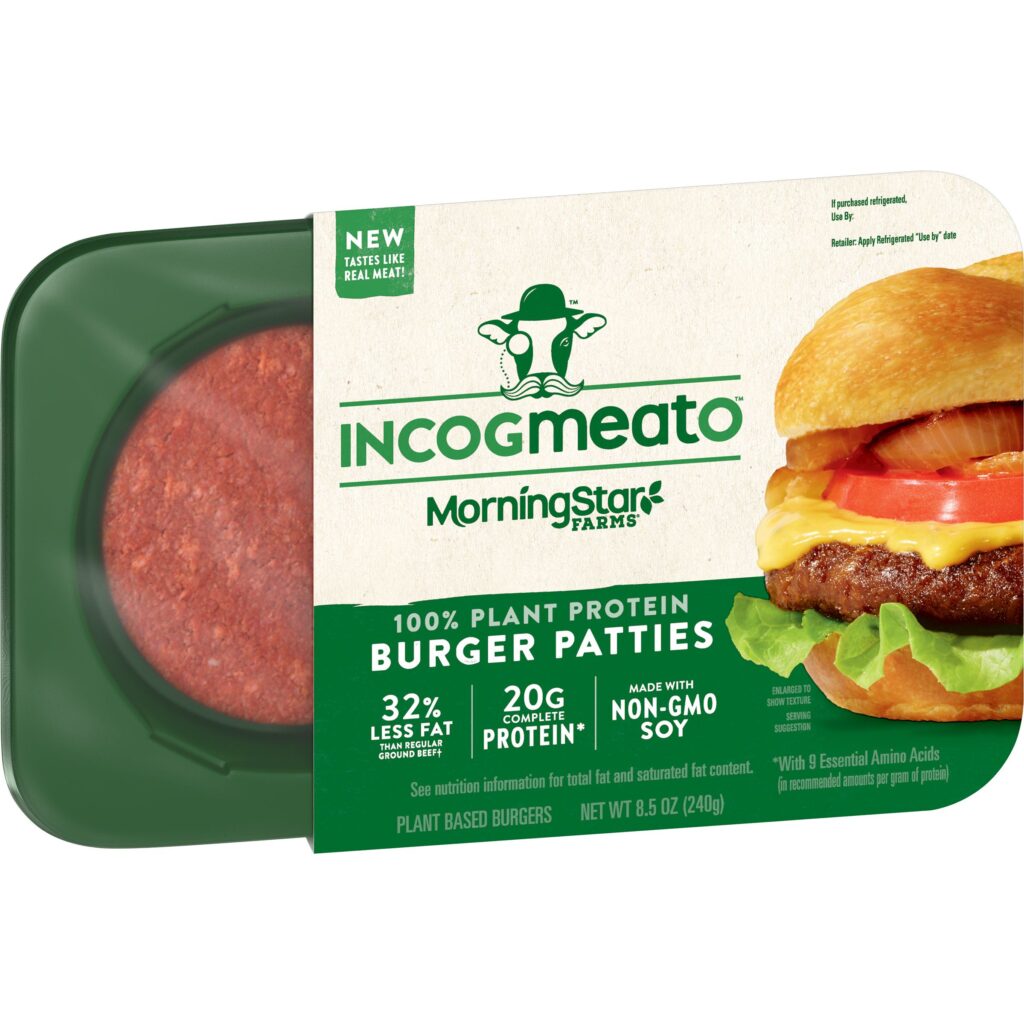
Morning Star Farms started making plant-based foods back in 1974. At that time they launched three soy-based breakfast products. These breakfast links, patties, and slices and were some of the first plant-based foods readily available in the market. At that time, Morning Star Farms’ products were only available in the frozen aisle.
Since then they have expanded their company and product lines. The company has joined the fresh plant-based burger industry. Incogmeato is the plant-based meat brand in the Morning Star Farms family.
Incogmeato’s ingredient list begins with water. After that soy protein concentrate, canola oil, palm oil, methylcellulose, and <2% of natural flavors, as well as potato starch, dextrose, and salt complete the list.
Similar to Lightlife, Incogmeato uses only one protein source in its plant-based burger, and that is soy. As we mentioned earlier, soy protein is a complete protein. It has a biological value similar to beef, and therefore contains all of the essential amino acids found in animal proteins.
The Incogmeato plant-based meat contains palm oil which is another saturated fat. Consequently, this contributes to the 5 grams of saturated fat found in the burger. In addition, canola oil makes up the difference, resulting in 18 grams of total fat.
Additional ingredients in the Incogmeato burger provide some vitamins and minerals, including apple juice powder (color), yeast extract, corn starch, sunflower lecithin, vegetable juice concentrate (color), pectin, and citric acid. As well as Vitamin B1, Vitamin B12, Ascorbic Acid Calcium, Potassium, and Iron.
Incogmeato plant-based burger vs 93%/7% beef burger:
| Nutrition Information | Incogmeato burger (4 oz) | 93%/7% burger (4 oz) |
|---|---|---|
| Calories | 250 | 172 |
| Total Fat (grams) | 18 | 7.9 |
| Saturated Fat (grams) | 5 | 3.3 |
| Cholesterol (milligrams) | 0 | 71 |
| Sodium (milligrams) | 370 | 75 |
| Total Carbohydrates (grams) | 12 | 0 |
| Dietary Fiber (grams) | 8 | 0 |
| Total Sugars (grams) | <1 | 0 |
| Protein (grams) | 21 | 24 |
| Vitamin/ minerals | Vitamin B1, Vitamin B12, Ascorbic Acid (Vitamin C), Calcium, Potassium, Iron | Iron, Potassium |
The calorie, sodium, and protein contents of the Incogmeato burger are equivalent to all the plant-based burgers we have discussed so far. Similarly, they all contain saturated fat.
On the plus side: the Incogmeato burger is made from high-quality soy protein and is made with palm oil instead of coconut oil. According to an article in Harvard Health Publishing, both are saturated fats, however, palm oil is only 55% saturated while coconut oil is 85% saturated.
The Incogmeato burger has 8 grams of fiber, significantly more than the other plant-based meats, as well as, added vitamins and minerals.
On the downside: the Incogmeato burger has 18 grams of total fat, which is just slightly higher than the 14 and 17 grams in two of the other plant-based meats. The Incogmeato also has added sugar (dextrose).
Pure Farmland
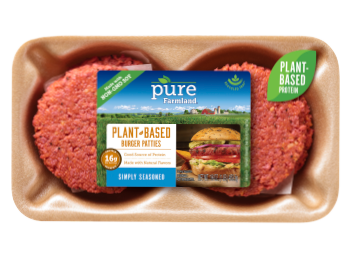
Pure Farmland plant-based meat products are another option in the market. These are their Simply-Seasoned burgers.
The ingredients begin with water and include Coconut Oil, Soy Protein Concentrate, Isolated Soy Protein, Canola Oil, Less Than 2% Spice Natural Flavorings, and Roasted Garlic Powder. These are followed by dehydrated Garlic, Onion Powder, Salt, Sunflower Oil, Soy Fiber, and Sugar.
Similar to Incogmeato and Lightlife, Pure Farmland uses just soy protein. As stated earlier, soy protein is a complete protein and has a biological value similar to beef.
As in the case with all the plant-based products above, there is added saturated fat and in this case, once again coconut oil is used.
Pure Farmland burger vs 93%/7% beef burger:
| Nutrition Information | Pure Farmland burger (4 oz) | 93%/7% burger (4 oz) |
|---|---|---|
| Calories | 220 | 172 |
| Total Fat (grams) | 14 | 7.9 |
| Saturated Fat (grams) | 7 | 3.3 |
| Cholesterol (milligrams) | 0 | 71 |
| Sodium (milligams) | 430 | 75 |
| Dietary Fiber (grams) | 3 | 0 |
| Total Sugars (grams) | <1 | 0 |
| Protein (grams) | 16 | 24 |
| Vitamin/ minerals | Calcium, Iron, Potassium, B vitamins from Yeast extract | Iron, Potassium |
The Pure Farmland burger is not fortified, however, it may contain B Vitamins and some minerals from the yeast extract. Further down the ingredient list, we find Red Beet Juice Concentrate (For Color), Paprika Oleoresin (For Color), Yeast Extract, and Cultured Dextrose. Followed by Maltodextrin (From Corn, Tapioca, and Potato), Methylcellulose, Citric Acid, and Soy Lecithin.
On the plus side, the Pure Farmland burger is made from soy protein, as well as the least amount of calories. It is tied with the Impossible burger having only 14 grams of total fat.
On the downside, the Pure Farmland burger has the most added salt and consequently the highest sodium content, as well as the least amount of protein in a 4 oz patty.
To summarize
All of the vegetable protein plant-based meats we looked at have both good and not-so-good qualities. For instance, they all have added coconut or palm oil, and therefore, added saturated fat. Additionally, they all have additives that increase the sodium content, act as preservatives, or are added for color.
While some additives come from natural sources, such as beet juice, some come with controversy. For example, soy lecithin is one that is considered harmful by some, due to the solvents used in its processing.
All the plant-based meats have quality protein sources and some added vitamins and minerals.
Plant-based meat burgers vs 93%/7% beef burger:
| Nutrition | Impossible | Beyond Meat | Light Life | Incogmeato | Pure Farmland | 93%/7% |
|---|---|---|---|---|---|---|
| Calories | 240 | 260 | 250 | 250 | 220 | 172 |
| Total Fat (grams) | 14 | 18 | 17 | 18 | 14 | 7.9 |
| Saturated Fat (grams) | 8 | 5 | 5 | 5 | 7 | 3.3 |
| Cholesterol (milligrams) | 0 | 0 | 0 | 0 | 0 | 0 |
| Sodium (milligrams) | 370 | 350 | 390 | 370 | 430 | 75 |
| Total Carbohydrates (grams) | 9 | 5 | 6 | 12 | 11 | 0 |
| Dietary Fiber (grams) | 3 | 2 | 1 | 8 | 3 | 0 |
| Total Sugar (grams) | <1 | <1 | <1 | <1 | <1 | 0 |
| Protein (grams) | 19 | 20 | 20 | 21 | 24 | |
| Vitamin/Minerals | Vitamin E, Vitamin C, B Vitamins, B12, Niacin, Zinc | Vitamin A, Vitamin C, Vitamin E, Potassium, Antioxidants (mung bean: folate manganese, magnesium) | Calcium, Potassium, Iron | Vitamin B1, Vitamin B12, Ascorbic Acid (Vitamin C), Calcium, Potassium, Iron | Calcium, Iron, Potassium, B vitamins from Yeast extract | Iron, Potassium |
Why not make your own plant-based burger at home?
Registered dietitian Julie Kay Andrews, owner of The Gourmet RD, has a plant-based burger recipe you’ll want to try. It’s her Chickpea and Watercress burger, made with chickpeas and a spicy garlic sauce.
Or try dietitian Nancy Macklin’s Five-Ingredient Veggie Burger recipe made with black beans and rolled oats.
In conclusion
In this writer’s opinion, as a plant-based eater, unless you are really yearning for the taste of a meat burger, the plant-based alternatives are not the best or healthiest choices. Their added saturated fat, high sodium content, and additives make them less desirable. However, they do provide fiber, quality plant protein, and some added vitamins, and minerals.
As a once in a while option these burger alternatives are an acceptable addition to a plant-based diet. There isn’t one that is significantly “better” than the other in terms of ingredients, calories, and nutrition. I vote for home made!

